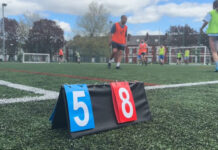Diabetes can appear as a barrier to sport for people living with the condition. But it doesn’t have to be that way.
Mersey Sport Live’s Amelia Russell takes a closer look at the topic during Diabetes Awarness Month.
“I don’t think there’s another condition in 2024 as stigmatised as diabetes”, says Clare Howarth, head of Diabetes UK in the North.
It is estimated over 5 million people in the UK are living with diabetes, including over one million people who are yet to be diagnosed with type 2.
Around 8% of people with diabetes have Type 1, with the other 90% having Type 2.
This Diabetes Awareness Month, we have seen a surge of conversation around the condition and what needs to be done to reduce the stigma.
Clare explained how Diabetes UK have launched their campaign to have, “an open and honest online conversation about diabetes stigma.”
She said: “It’s a condition regardless of what type you’ve got, you’re never off duty, so you’re stuck with this condition. It’s very hard. It’s very relentless.”
Chris Bright is just one of many people in the UK spearheading the education and awareness of diabetes as a disability. By starting the Diabetes Football Community in 2018, he has provided support for diabetics up and down the country, allowing them to share experiences, ask questions and seek guidance about the condition.
Chris was diagnosed with Type 1 diabetes in 1999. He has played football for his county, university and as a semi-professional but says he struggled with feeling accepted in the sport.
He said: “Other people’s views of a medical condition play a big part in whether you feel included or feel comfortable in an environment.
“I found myself hiding it, I found myself not telling people about my condition in football environments.”
Runcorn Linnets striker Lucy Wieland, who also works for Diabetes UK, oversees a project funded by the Merseyside based Steve Morgan Foundation, to allow children and young people to feel like they can be open and honest about living with diabetes.
She said: “We put on events to bring young people together living with type 1 because it can become like an isolating condition. There’s a lot of people that go to school and they’re the only one in their whole school who’ve got type 1 diabetes.”
Lucy found out she had diabetes aged 13, the same time she started playing football. She explains how better awarness of the condition has helped her and many others feel safe and included in the sport.
She said: “What makes it easier for us to play is your managers and your coaches knowing what type 1 diabetes is but also them not making a deal out of it.
“So it’s having that one-to-one conversation with that person with type 1 and just saying what can I do to support you?”
Listen to Clare, Chris and Lucy discuss the affect diabetes can have on people involved with sport >>>
There are many support groups and services available across merseyside which can be found on the Diabetes UK website.
















